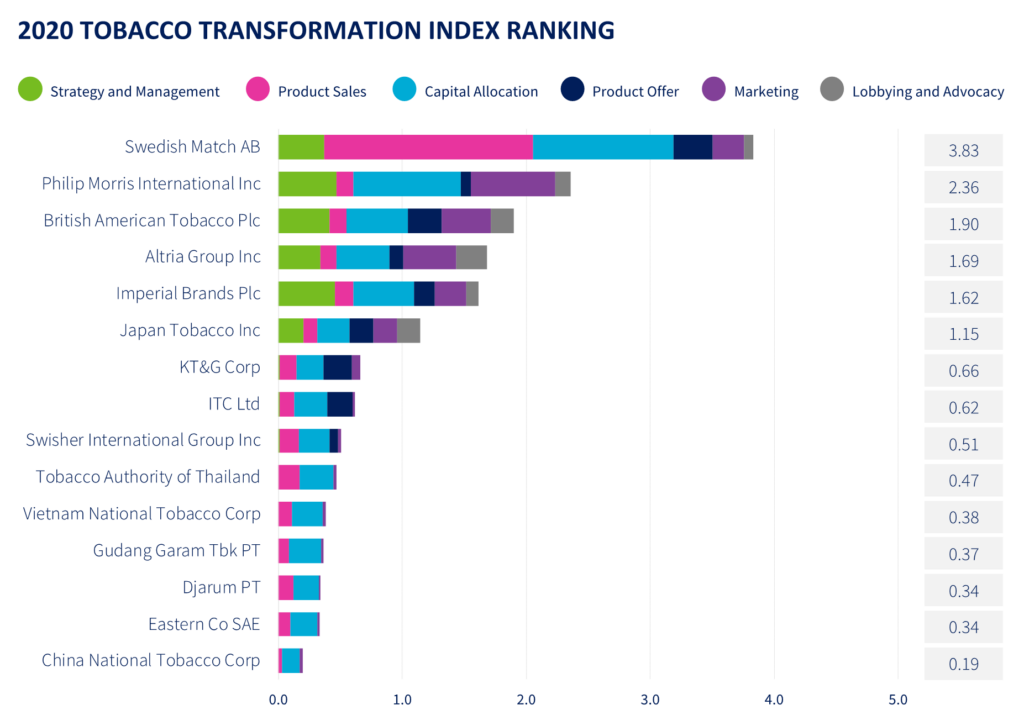An analysis of tobacco companies around the world has found very limited progress on the phasing out of cigarettes, while many are failing to acknowledge any role in tackling the challenges of tobacco-related death and disease.
Research from the Foundation for a Smoke-Free World found that despite many companies talking about the promotion of e-cigarettes, tobacco still represents 95% of the industry’s sales representing marginal declines over the past few years.
The Foundation analysed 15 companies to create the 2020 Tobacco Transformation Index, which ranks companies based on their strategy and management, product sales, capital allocation, product offering, marketing, lobbying and advocacy.
See also: – Should sustainable investors exclude tobacco?
For background, it also highlighted there are 1.3 billion tobacco users in the world, of which eight million die annually from tobacco-related diseases, and if adult cessation and tobacco harm reduction were to occur a significant number of deaths could be prevented over the next two decades.
The Tobacco Transformation Index’s key findings revealed cigarette sales overall fell from 4.9 trillion sticks to 4.8 trillion from 2017 to 2019.
Just six of the 15 companies have expressed some form of commitment to tobacco harm reduction, and nine of the overall group failed to acknowledge any role in tackling the challenges of tobacco-related death and disease and have made no explicit commitment to harm reduction.

Furthermore, among the six companies that claim to have committed to harm reduction, between 30-55% of their marketing budgets are still devoted to high-risk products. Additionally, BAT, PMI, and Swedish Match allocated the majority (80-90%) of their budget to expand or build new facilities or convert cigarette facilities to this purpose.
Transparency and disclosure
The highest ranked companies in the Tobacco Transformation Index are Swedish Match, PMI, BAT Altria, Imperial and JTI – all publicly traded and therefore required to meet more stringent reporting measures and also subject to increased scruntny from stakeholders.
The Smoke-Free World Foundation said the 2020 Index includes seven transparency indicators addressing companies’ disclosure of information; BAT and PMI each earned 57% of the available score for these indicators, followed by Altria, reaching 50%. Imperial, JTI, and Swedish Match each achieved 40% of the total transparency score, while the remaining nine companies scored zero.
Disappointingly, of the six companies that claim to adhere to voluntary codes, only PMI discloses reported violations or details of investigations indicating much better disclousure and greater overall transparency is needed across many firms.
Additionally, the research said, only Altria provides comprehensive details concerning lobbying and political engagement activities.
At the same time, investors have taken a heightened notice of the internal practices of companies, leading boards and management teams to re-evaluate their commercial strategy’s impact on the world. Many more investors are also excluding tobacco completely from portfolios.
Additionally, the Foundation said, the percentage of retail and institutional investors that apply ESG principles to at least a quarter of their portfolios jumped from 48% to 75% (2017-19).
Regional product efforts
The research also found the regional disparities in terms of products promoted; tobacco companies tend to focus most of their reduced-risk product efforts – such as e-cigarettes – on higher income countries, while high-risk product sales in lower income countries continue to climb.
While overall cigarette sales declined annually by 1.2% in high-medium income countries, they increased by 1.7% annually between 2017-19. Overall sales of cigarettes by the 15 companies registered a 1.2% rate of annual decline in high-medium income countries between 2017 and 2019. For the same period, sales of cigarettes in low-medium income countries increased by 1.7%.
Dr Derek Yach, president of the Foundation for a Smoke-Free World, commented: “Inspired by the success that indexes focusing on other sectors have demonstrated, the goal of the Tobacco Transformation Index is to stimulate external pressure and the industry competition needed to take combustion out of the cigarette market, accelerate change, and lower the unnecessary disease, death, and misery it causes so many people.
“Society and large institutional investors such as banks and pension funds, which represent 85% of investment in publicly traded tobacco companies, have the leverage to push tobacco company management to drive measures that greatly improve health.”








